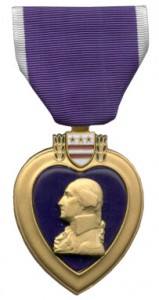Awarding the Purple Heart for the Value of Heart
 In the United States, the Purple Heart has a very special meaning. As the oldest military award, it is a decoration awarded on behalf of the President to those who haven been wounded or killed while serving with the U.S. military.
In the United States, the Purple Heart has a very special meaning. As the oldest military award, it is a decoration awarded on behalf of the President to those who haven been wounded or killed while serving with the U.S. military.
This is not an award a soldier seeks to possess.
The estimated 1.9 million men and women who have been given or honored with the Purple Heart paid a great price. They suffered an injury in a combat zone or even lost their life defending their country.
The original – and first – military award was called the Badge of Military Merit. It was established by George Washington, who awarded only three of these to Revolutionary War soldiers. Designed by Washington in the form of a purple heart, he intended this award for soldiers who exhibited, “not only instances of unusual gallantry in battle, but also extraordinary fidelity and essential service in any way.”
The current Purple Heart was commissioned by General Douglas MacArthur and re-instituted in 1932. It was awarded to worthy soldiers, or their families upon request, for sacrifices dating back to April 5, 1917, the day before the United States entered WWI.
How appropriate that the shape chosen for this military award is a heart.
Heart as a Value
As a differentiating value, Heart means the courage to carry on; or the locus of feelings and intuitions. The combination of these two meanings possesses great power.
A soldier who seizes the courage to carry on when it’s difficult, has heart. A soldier who keeps his or her faith in the reason for fighting, who preserves the feelings of loyalty to their country, has heart. A soldier who relies on their intuition to ‘do the right thing’ has heart.
Thankfully, not every soldier will receive a Purple Heart. But each one can embrace heart as a value. There is great honor in living this value.
The Search for Honor
There are families that continue to seek the Purple Heart posthumously to honor their parents and even grandparents for the sacrifices made for to their country.
In a recent case, Doris Bullock Gardner managed to obtain a Purple Heart in honor of the service and sacrifice her father – Noah Bullock of North Carolina – made in WWI. He took a bullet during a battle with the German Hindenburg, near Bellicourt France, in September 1918. He survived and returned to farming and eventually opened a country store.
In another case, Brad Anderson has been going through a long, arduous process to demonstrate his grandfather – Walter Anderson of Utah – deserved the Purple Heart for surviving chemical warfare (gas) from an attack in October 1918. After weeks of convalescing in a French hospital, he finally returned home to his wife and son, born in his absence.
Of course, with the wars of recent years, the Purple Heart continues to be awarded to soldiers – over 42,000 in the past ten years. And over 4,000 of these sacrificed with their life. The majority were wounded in action.
One such soldier who recently was awarded the Purple Heart was J.W. Owensby, of South Carolina. As a Marine, he suffered traumatic brain injury and a back injury when the vehicle he was driving hit an explosive device, March 2010 in Afghanistan. A friend of J.W. – Christopher Fowlkes – died in 2009 during fighting in Iraq. Thus, it was a very moving experience when Fowlkes’ uncle was the one to present the Purple Heart to J.W.
We are very thankful for such men and women who continue to demonstrate the value of heart so that we may live in freedom to share our heart with others.
Do you know someone who received the Purple Heart? What’s their story?
How can the value of heart help you make a difference?
Today’s value was selected from the “Confidence-Courage” category, based on the e-book Developing Your Differentiating Values.







